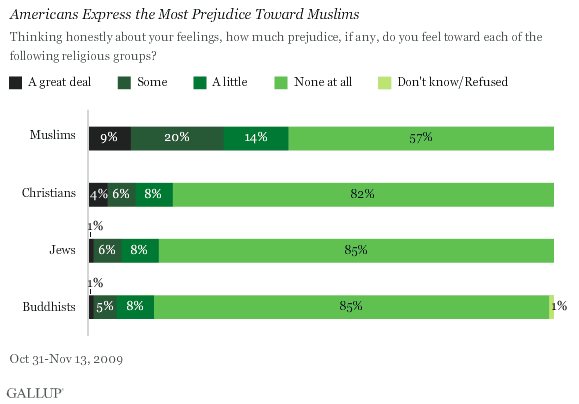
These findings come from Gallup poll results published this morning in a report, Religious Perceptions in America: With an In-Depth Analysis of U.S. Attitudes Toward Muslims and Islam.
Michelle Boorstein of the Washington Post said,
… the Gallup poll was prompted partly by Obama’s outreach to Muslim-majority societies and a desire to understand more about what shapes Americans’ views on Islam.
In a note accompanying the poll results, Gallup makes the argument that Americans’ prejudice against Muslims is at least partly fueled by misinformed beliefs. For example, people who believe Muslims worldwide oppose equal rights for men and women tend to be much more likely to report prejudice against Muslims.
The report states,
…feeling “a great deal†or extreme prejudice toward Muslims is not borne out of the absence of any information about Muslims, but rather arises from being exposed to negative media coverage of Islam and its followers.
This misinformation, especially through portrayals in the media, have a particular significance in the role of radicalization, as indicated in my published letter in the Globe yesterday. Daniel Simard and I also put together a paper related to this, Media Narratives in Times of Turmoil: Depictions of Minorities in Canada Post 9/11.
Boorstein also points to a Pew Forum poll showing that Muslims experience far more discrimination than any other group, by a wide margin.
The Gallop Poll found that 53% of Americans admitted to having negative views towards Islam, and 43% acknowledged some prejudice towards Muslims.
The report also states,
Variables Associated With Self-Reported Prejudice
Links Between Anti-Jewish and Anti-Muslim Prejudice
The variable most strongly linked to self-reported prejudice toward Muslims is self-reported prejudice toward Jews. Respondents who say they feel “a great deal†of prejudice — or extreme prejudice — toward Jews are about 32 times as likely to report feeling “a great deal†of prejudice toward Muslims. While Jewish-Muslim relations sometimes suffer because of the turbulence of the Israeli Palestinian conflict, among other reasons, these findings point to an area of potential cooperation for the two communities in addressing a common concern of prejudice toward each group. Previous Gallup research indicates that, compared with other religious groups in the U.S., Muslim Americans and Jewish Americans are most similar in terms of political ideology, education, and political party identification.
The findings should spurn greater cooperation between the Muslim and Jewish communities to work together in overcoming hatred and bigotry.





I would imagine that someone who hates one group is more likely to hate ANY other group.
Marc, that would be my take as well. But it seems based on this study that those two groups are specifically linked, at least in the American context.
In Europe, however, the situation might be entirely different. Yitzhak Laor writes yesterday in Is ‘Jewish pride’ abetting racism?,
Canada, I suspect, is somewhere in between these two, as usual. My response to the European phenomenon would be simple:
Interesting find in that it seems to defy my anecdotal experience. I’ve found that haters of one are quite often complete and unequivocal apologists for the other.
KC,
Unfortunately that’s probably the trend which is on the increase, probably in part due to the European phenomenon noted above.
All the more imperative to demonstrate that this is not a necessary outcome. There are several ways to do this, in my opinion.
The Besa exhibit, showing Albanian relations with Jews, has attracted much attention, and I’ve seen it at both the United Nations and Yad Vashem.
I also came across this children’s book earlier today, which tells the story of Algerians who helped disguise French Jews and assisted their escape out of Paris through their mosque. They provided fake conversion certificates, hid Jewish children among their children, and acted as an important hub for an underground railroad of sorts to safer places.

One of the letters found from this era, written in Kabyle, states,
If we can teach the children to think differently, we might just have a chance of a better future.
You seem to think that what Yitzhak Laor describes is the widespread reality in Europe – thus leading to your suggestion that more people should be made aware of these two examples of particular Muslim communities helping persecuted Jews during the Holocaust. (As an aside, I can think of countless examples of overt anti-semitism by organized Muslim community organizations.)
I find Yitzhak Laor’s words quite offensive – he’s essentially saying that many Jewish communities in Europe somehow take quiet pleasure in the existence of racism towards Muslims, Africans and Gypsies. I have never known that to be the case, nor am I aware of any specific incidents that would suggest that. To argue that these Jewish communities are not speaking up enough implies that they have some sort of threshold obligation to publicly speak out. I don’t think they do.